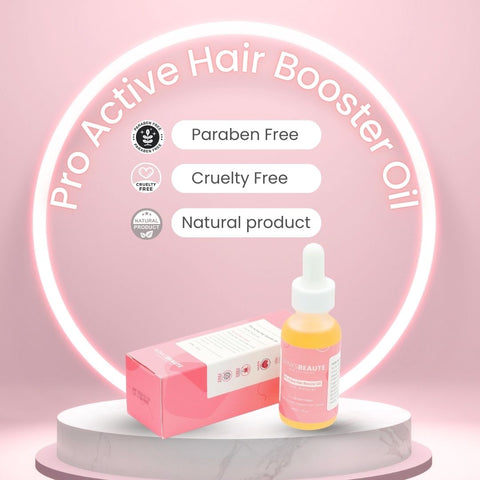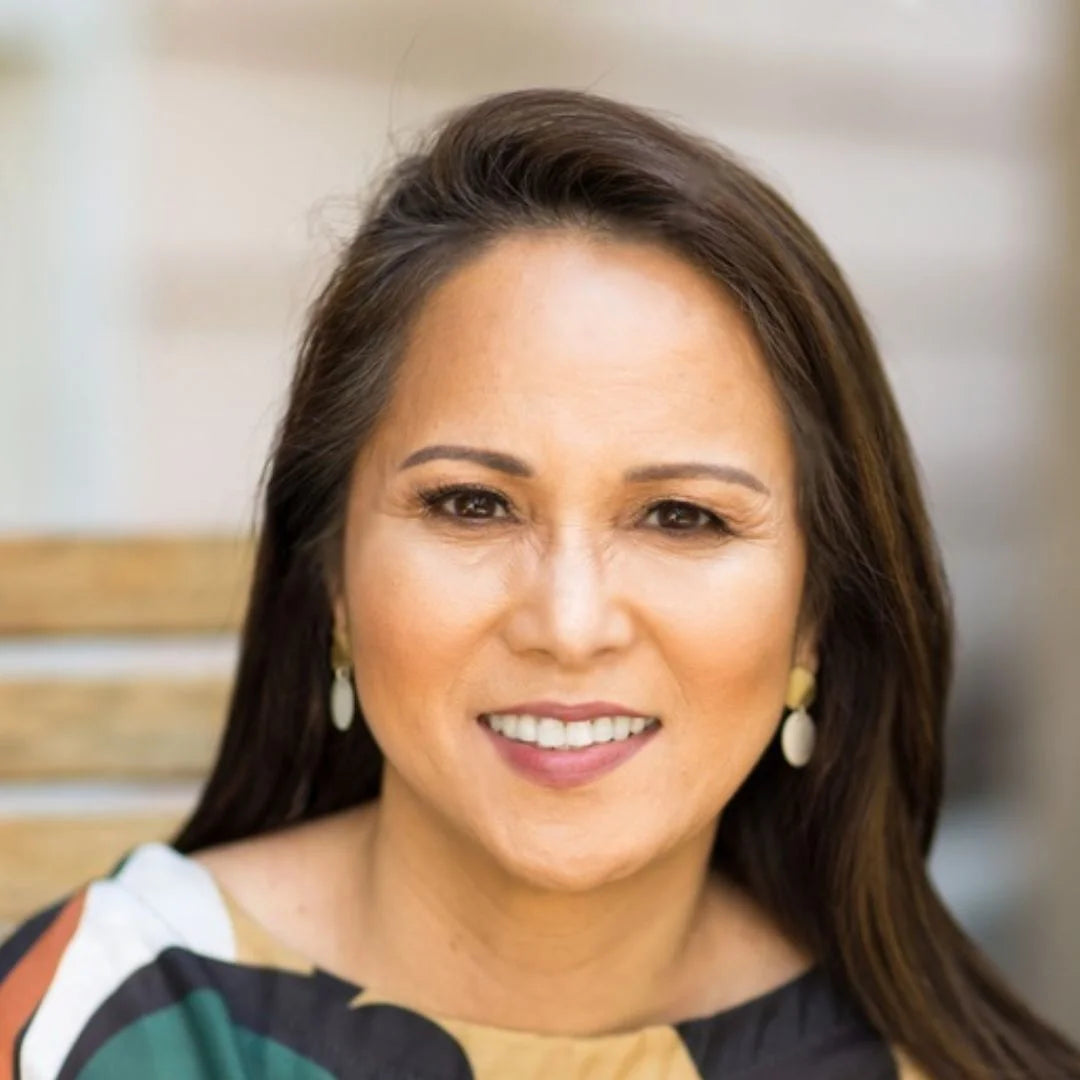
The Ultimate Guide to Menopause Hair Loss: Essential Vitamins for Hair Regrowth and Strengthening
Share
As women age, they go through a significant hormonal change known as menopause. Menopause comes with a variety of symptoms, and one of the most common and distressing ones is hair loss. Understanding why hair loss occurs during menopause is essential in finding the right solutions to combat it.
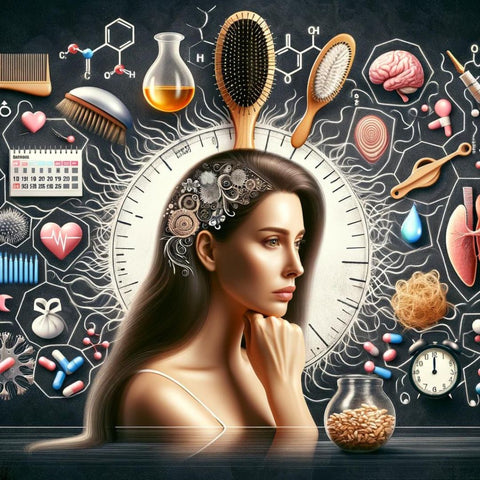
During menopause, the levels of estrogen and progesterone in a woman's body decrease. These hormones play a vital role in maintaining hair growth and health. As their levels decline, the hair follicles become more sensitive to the hormone dihydrotestosterone (DHT). DHT can cause the hair follicles to shrink, resulting in thinner and weaker hair strands. Additionally, the decreased production of estrogen can lead to a shorter hair growth cycle, causing hair to shed more rapidly.
Causes of hair loss during menopause
Apart from hormonal changes, there are other factors that contribute to hair loss during menopause. Stress, poor nutrition, and certain medical conditions can all play a role in exacerbating hair loss. Stress can disrupt the normal hair growth cycle, leading to excessive shedding. Poor nutrition, especially a deficiency in essential vitamins and minerals, can weaken the hair follicles and make them more susceptible to damage. Medical conditions such as thyroid disorders and autoimmune diseases can also cause hair loss during menopause.
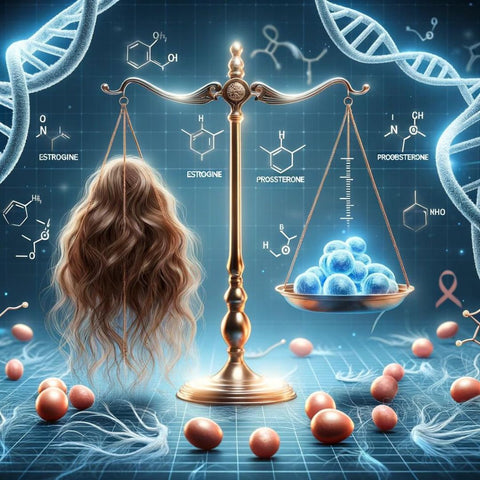
The role of hormones in menopause hair loss
As mentioned earlier, hormonal changes during menopause are one of the primary causes of hair loss. Estrogen and progesterone are essential for maintaining healthy hair growth. These hormones help to prolong the hair growth cycle and keep the hair follicles in the anagen (growth) phase for a longer period. When the levels of estrogen and progesterone decline, the hair growth cycle is shortened, leading to increased shedding and thinner hair strands.
In addition to estrogen and progesterone, testosterone and DHT also play a role in menopause hair loss. Testosterone, which is present in both men and women, can be converted into DHT by the enzyme 5-alpha reductase. DHT has been found to shrink hair follicles and shorten the hair growth cycle. Women going through menopause may experience an increase in DHT levels due to hormonal imbalances, leading to hair thinning and loss.
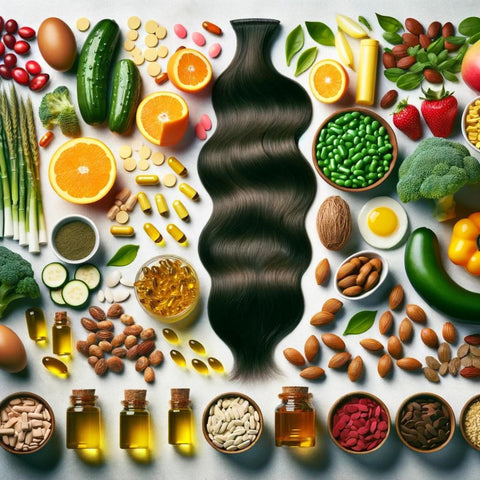
Essential vitamins for hair regrowth and strengthening
While hormonal changes are a significant factor in menopause hair loss, there are ways to promote hair regrowth and strengthen the hair follicles. One effective approach is to ensure you are getting the right vitamins and nutrients in your diet. Here are some essential vitamins that can help with hair regrowth and strengthening during menopause:
Vitamin A: Promoting hair growth and health
Vitamin A is essential for the growth and maintenance of healthy hair. It helps in the production of sebum, which moisturizes the scalp and keeps the hair follicles healthy. Vitamin A also aids in the synthesis of keratin, a protein that makes up the hair strands. Good sources of vitamin A include carrots, sweet potatoes, spinach, and kale.

Vitamin B complex: Nourishing hair follicles and preventing hair loss
The B vitamins, including Biotin, B3 (Niacin), and B6, are crucial for hair health. Biotin, in particular, is known to strengthen hair and prevent breakage. Niacin improves blood circulation to the scalp, promoting hair growth. Vitamin B6 helps in the production of melanin, the pigment responsible for hair color. Whole grains, eggs, nuts, and leafy greens are excellent sources of vitamin B complex.

Vitamin C: Boosting collagen production and improving hair strength
Vitamin C is an antioxidant that plays a vital role in collagen production. Collagen is a protein that gives structure to the hair and promotes its strength and elasticity. Additionally, vitamin C helps in the absorption of iron, which is necessary for healthy hair growth. Citrus fruits, strawberries, bell peppers, and broccoli are rich sources of vitamin C.
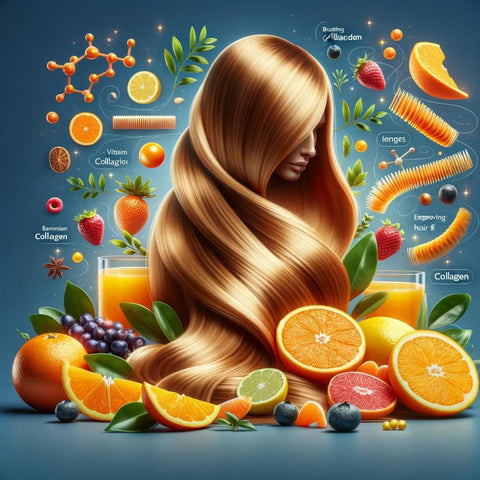
Vitamin D: Enhancing hair growth and reducing hair thinning
Vitamin D is crucial for hair follicle health and hair growth. It helps in the activation of hair follicles and aids in the production of new hair cells. Vitamin D deficiency has been linked to hair thinning and hair loss. Sun exposure is the best natural source of vitamin D, but it can also be obtained from fatty fish, fortified dairy products, and supplements.

Vitamin E: Protecting hair follicles and promoting hair growth
Vitamin E is an antioxidant that helps protect the hair follicles from oxidative stress. It improves blood circulation to the scalp, promoting healthy hair growth. Vitamin E also provides a protective barrier to the hair follicles, preventing damage from environmental factors. Nuts, seeds, spinach, and avocado are excellent sources of vitamin E.
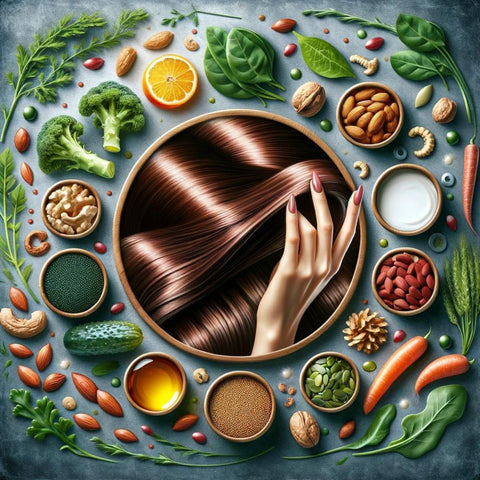
Other nutrients and supplements for menopause hair loss
In addition to vitamins, there are other nutrients and supplements that can help combat menopause hair loss. Omega-3 fatty acids, found in fatty fish, walnuts, and flaxseeds, have anti-inflammatory properties that can reduce hair loss. Iron is essential for healthy hair growth, and its deficiency can lead to hair thinning and shedding. Incorporating iron-rich foods such as lean meats, legumes, and leafy greens can help prevent hair loss. Zinc, found in oysters, pumpkin seeds, and beef, is also important for hair health and growth.
If you are unable to get enough of these essential nutrients through your diet, supplements can be a helpful addition. Consult with your doctor or a healthcare professional to determine the right dosage and type of supplements for your specific needs.

Incorporating essential vitamins into your diet
Now that you know which vitamins are essential for hair regrowth and strengthening, it's important to incorporate them into your diet. A well-balanced diet that includes a variety of fruits, vegetables, whole grains, lean proteins, and healthy fats will provide the necessary nutrients for your hair health. Consider adding more vitamin-rich foods to your meals and snacks, and try to avoid processed foods and sugary drinks that can have a negative impact on hair health.
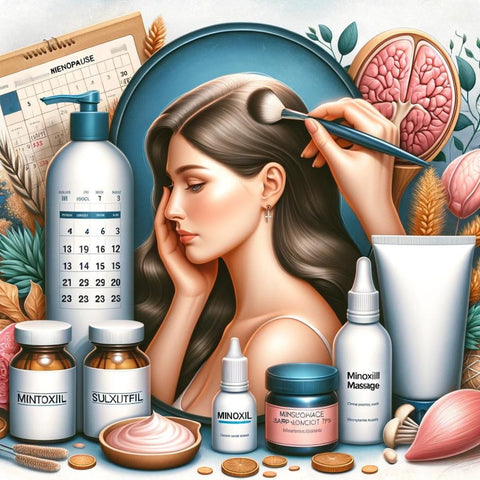
Topical treatments and hair care tips for menopause hair loss
Navigating hair loss during menopause requires a multifaceted approach, blending dietary adjustments with targeted hair care strategies. Opt for gentle shampoos and conditioners crafted for thinning hair to nurture rather than strain your strands. Minimize the use of heat-styling tools and avoid harsh chemicals, as these can exacerbate follicle damage. Minoxidil, an FDA-approved solution for hair regrowth, stands as a viable option for those seeking treatment. Additionally, regular scalp massages can boost blood circulation to the follicles, fostering a healthier environment for hair growth.
For a more holistic and long-term solution, integrating Proactive Rosemary Hair Booster Oil into your routine offers a natural alternative. Infused with rosemary oil, known for its ability to enhance scalp health and stimulate hair growth, this product supports your hair through menopause and beyond. Its nourishing blend of natural ingredients works synergistically to strengthen hair follicles, combat thinning, and promote a fuller, more vibrant head of hair.

Seeking professional help for menopause hair loss
If you have tried various home remedies and lifestyle changes but are still experiencing significant hair loss during menopause, it may be time to seek professional help. A dermatologist or a trichologist can evaluate your condition and provide personalized recommendations and treatments. They may suggest hormone replacement therapy, PRP (platelet-rich plasma) therapy, or other medical interventions to help restore hair growth and strengthen the hair follicles.
Conclusion
Hair loss during menopause can be distressing, but there are effective solutions available. Understanding the causes of menopause hair loss, such as hormonal changes and other factors, is crucial in finding the right treatment approach. Incorporating essential vitamins into your diet, using topical treatments, and seeking professional help when needed can all contribute to hair regrowth and strengthening. Remember, everyone's experience with menopause hair loss is unique, so it's important to find the solutions that work best for you. With the right combination of treatments and care, you can maintain healthy and beautiful hair during and after menopause.

